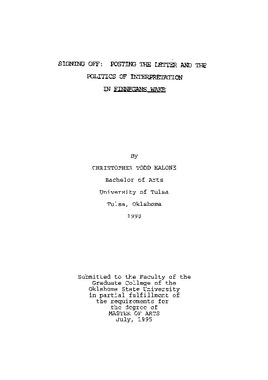| dc.description.abstract | Hugh Kenner characterizes Ulysses as a book "from which we are systematically taught the skills we require to read it." If this is true, then we might say Finnegans Wake seemingly offers little or no help at all as we try to read and "make sense out of" the text. It repeatedly undermines those skills we would like to think we possess as "close readers," while at the same time raising questions about the merit or usefulness of any number of critical approaches to the text. Working with the text over the last two years, I have been made both joyfully and painfully aware of this quality, this difficulty or "problem" with reading the text, and, consequently, have developed a real love/hate relationship with Finnegans Wake. The book was spoon-fed to me my first semester as a graduate student, but I knew even at that time that I would work with it for my thesis--a kind of love at first sight. My feeling then was that it would afford an opportunity to explore my interest in critical theory, to bring certain concerns to the text since it seems opaque enough to accommodate anything, as the history of criticism on the Wake suggests. What has happened along the way is that reading the text has helped define my interest in theory more clearly, or at least more carefully, allowing me to formulate and begin to answer certain questions about what it means to read literature. At the same time, the text for me has always managed to keep its distance, always holds the reader at bay, along with his or her interpretive assumptions. This frustration that is so much a part of reading the text makes it a difficult book to love. But those who respond to the text in this way, with frustration at not being able to make the text "make sense," would seem to miss out on the fun involved in reading a text like the Wake; they remain unaware of what it means to laugh along with Joyce and to bring that response to the text as well. Letting myself in on this laughter, reading the text with this mixed response, I would agree with Susan Shaw Sailer when she writes that "Learning to read Finnegans Wake has changed the way I read." In this sense, it is not entirely true that the Wake offers no help to its readers, as I attempt to argue in this thesis. There are no skills that I would claim (for myself or the text), as Kenner suggests, but that is part of the lesson, I think. | |
